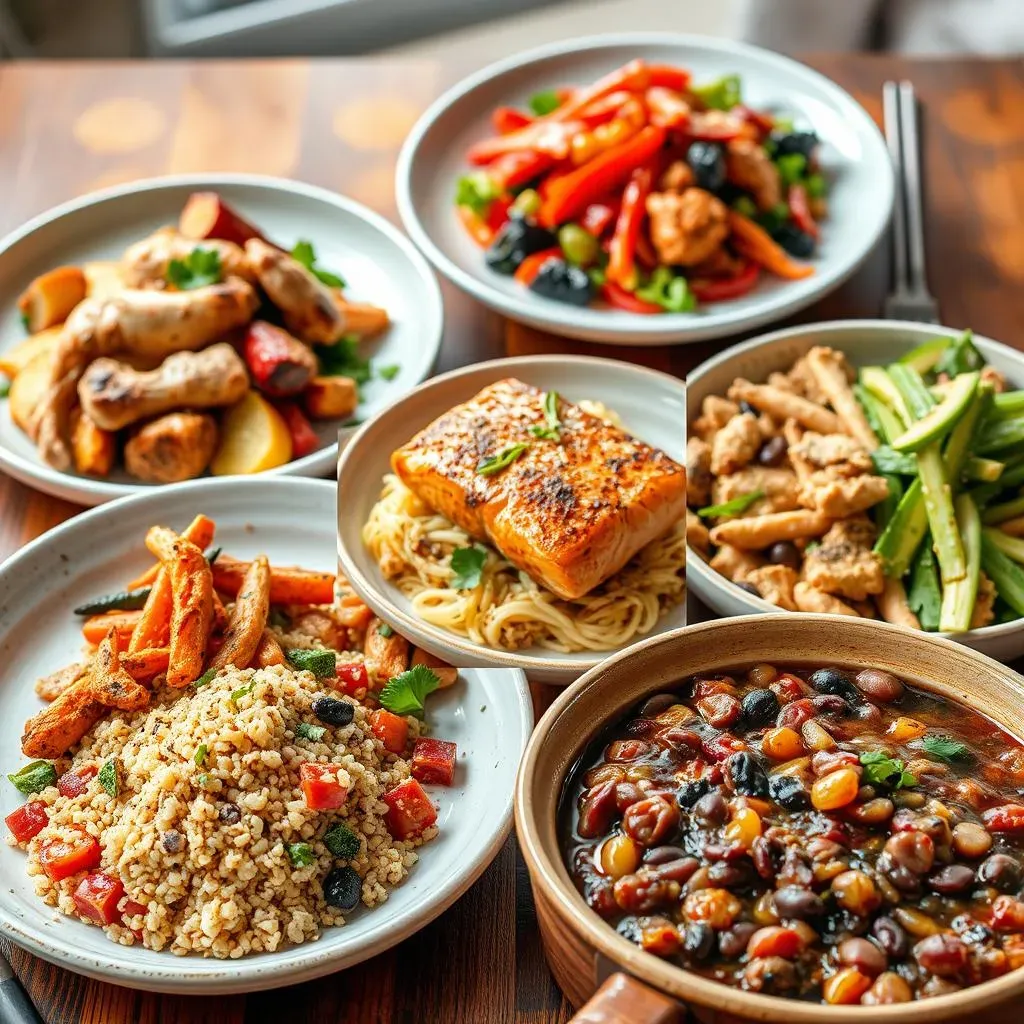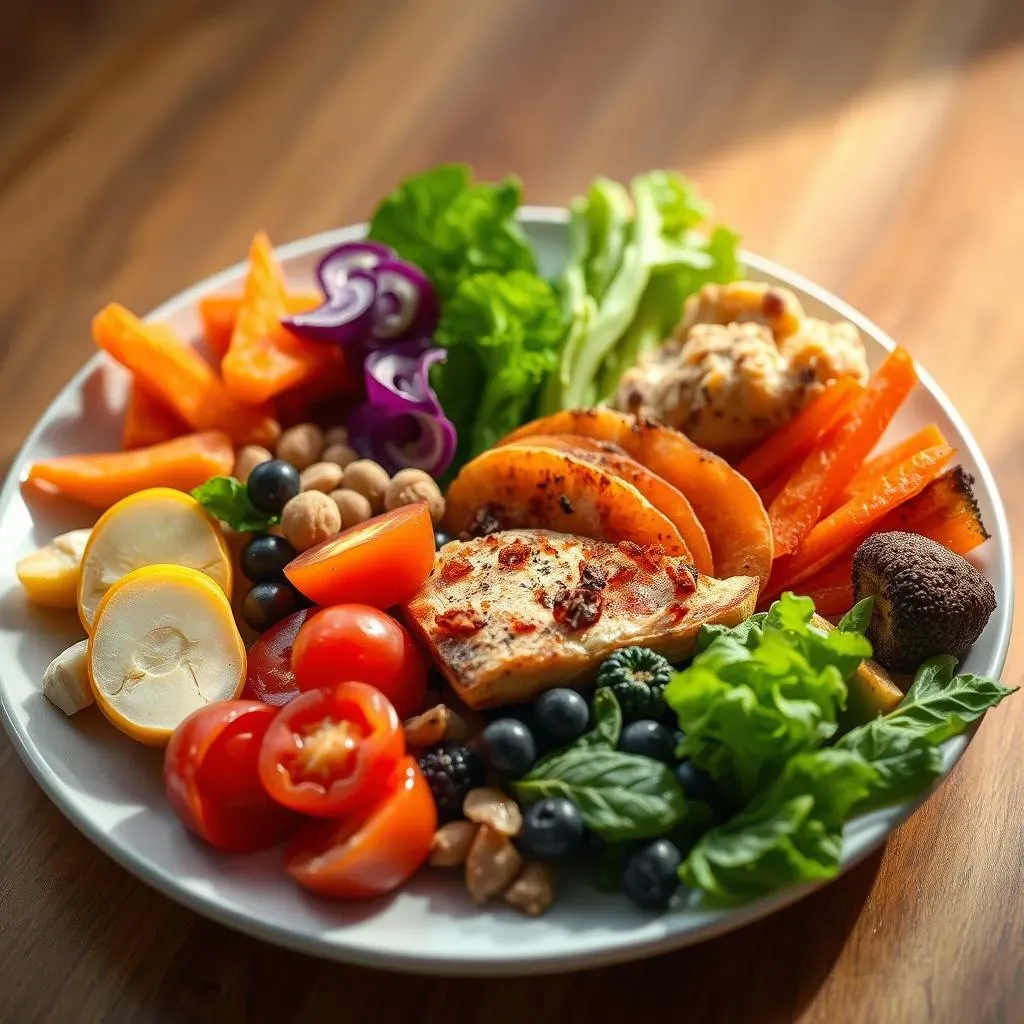Table of Contents
Dealing with Polycystic Ovary Syndrome (PCOS) can feel like navigating a maze, especially when it comes to diet. But what if I told you that creating delicious and nourishing meals doesn't have to be a struggle? This article is your roadmap to crafting satisfying PCOS healthy dinner options that not only tantalize your taste buds but also help manage your symptoms naturally.
Understanding PCOS and the Importance of a Healthy Dinner

Understanding PCOS and the Importance of a Healthy Dinner
What is PCOS?
Polycystic Ovary Syndrome (PCOS) is a common hormonal disorder affecting women of reproductive age. It's characterized by irregular menstrual cycles, elevated levels of androgens (male hormones), and/or the presence of small cysts on the ovaries. However, not everyone with PCOS has cysts, and the symptoms can vary widely from person to person.
Think of it like this: your body's hormones are like an orchestra, and PCOS throws the whole thing out of tune. This hormonal imbalance can lead to a cascade of symptoms, impacting everything from your periods and fertility to your skin and weight. It's not just about your ovaries; PCOS is a systemic condition that affects your overall health.
Common PCOS Symptoms
The symptoms of PCOS are diverse and can manifest differently in each individual. Some women may experience only mild symptoms, while others face significant challenges. Recognizing these symptoms is the first step toward effective management.
- Irregular Periods: Infrequent, irregular, or prolonged menstrual cycles are a hallmark of PCOS.
- Fertility Issues: PCOS is a leading cause of infertility due to irregular ovulation or lack of ovulation.
- Hirsutism: Excessive hair growth on the face, chest, or back is a common symptom.
- Acne: Hormonal imbalances can lead to persistent acne breakouts.
- Weight Gain: Many women with PCOS struggle with weight gain and difficulty losing weight.
- Ovarian Cysts: While not always present, small cysts may develop on the ovaries.
- Skin Darkening: Patches of darkened skin, particularly in the groin, neck, or underarms (acanthosis nigricans).
It's important to note that experiencing one or two of these symptoms doesn't automatically mean you have PCOS. A proper diagnosis requires a comprehensive evaluation by a healthcare professional.
Why Dinner Matters for PCOS Management
Now, let's talk about why your dinner plate is a powerful tool in managing PCOS. What you eat directly impacts your hormones, blood sugar levels, and inflammation – all key players in PCOS. A well-planned dinner can help stabilize blood sugar, reduce insulin resistance, and provide essential nutrients that support hormonal balance.
Imagine your body as a car. If you fill it with low-quality fuel, it won't run smoothly. Similarly, a dinner loaded with processed foods, sugary drinks, and unhealthy fats can exacerbate PCOS symptoms. On the other hand, a dinner packed with lean protein, fiber-rich vegetables, and healthy fats can provide sustained energy, reduce cravings, and promote overall well-being.
Here's a quick look at how different components of your dinner can impact your PCOS:
Nutrient | Benefits for PCOS |
|---|---|
Lean Protein | Helps stabilize blood sugar, promotes satiety, and supports muscle mass. |
Fiber | Slows down glucose absorption, improves insulin sensitivity, and aids digestion. |
Healthy Fats | Supports hormone production, reduces inflammation, and promotes heart health. |
PCOSFriendly Dinner Recipes: Quick, Easy, and Delicious

PCOSFriendly Dinner Recipes: Quick, Easy, and Delicious
Alright, let's get to the good stuff: the recipes! I know you're busy, so I've focused on creating PCOS-friendly dinner recipes that are quick, easy, and, most importantly, delicious. Forget spending hours in the kitchen – these meals are designed to fit into your busy lifestyle without sacrificing flavor or nutrition. We're talking about dinners that support your hormonal balance, keep you feeling full and satisfied, and won't leave you reaching for sugary snacks later on. Think vibrant salads, hearty bowls, and comforting skillet dishes, all packed with the good stuff your body needs to thrive with PCOS.
The key here is to focus on whole, unprocessed ingredients. Load up on colorful vegetables, lean proteins, and healthy fats. Don't be afraid to experiment with different spices and herbs to add flavor and excitement to your meals. And remember, cooking should be enjoyable, not a chore! So, put on some music, grab a friend, and let's get cooking!
One-Pan Lemon Herb Roasted Chicken and Veggies
This is a weeknight winner! Toss chicken thighs and your favorite veggies (broccoli, bell peppers, zucchini) with olive oil, lemon juice, garlic, and herbs. Roast until the chicken is cooked through and the veggies are tender. It's a complete meal with minimal cleanup!
Salmon with Roasted Asparagus and Quinoa
Salmon is packed with omega-3 fatty acids, which are great for reducing inflammation. Roast asparagus with olive oil and lemon juice, and serve with a side of quinoa for a complete and balanced meal.
Turkey and Black Bean Chili
This chili is hearty, flavorful, and packed with protein and fiber. Use lean ground turkey and plenty of beans and vegetables. Top with avocado and a dollop of plain Greek yogurt for added healthy fats and protein.
Recipe | Prep Time | Cook Time | Key Ingredients |
|---|---|---|---|
Lemon Herb Chicken & Veggies | 10 minutes | 30 minutes | Chicken thighs, broccoli, lemon, herbs |
Salmon with Asparagus & Quinoa | 5 minutes | 20 minutes | Salmon, asparagus, quinoa, lemon |
Turkey & Black Bean Chili | 15 minutes | 30 minutes | Ground turkey, black beans, tomatoes, spices |
Building a Balanced PCOS Healthy Dinner Plate: Key Nutrients

Building a Balanced PCOS Healthy Dinner Plate: Key Nutrients
The PCOS Plate: A Visual Guide
Think of your plate as a canvas, and the food you put on it as the colors. When building a balanced PCOS healthy dinner, aim for a vibrant and diverse palette that supports your hormonal health. The goal is to create a meal that stabilizes blood sugar, reduces inflammation, and provides essential nutrients.
A good rule of thumb is to follow the plate method: half of your plate should be non-starchy vegetables, one-quarter should be lean protein, and the remaining quarter should be complex carbohydrates. Don't forget a serving of healthy fats to round out the meal! This approach ensures you're getting a variety of nutrients without overloading on any one macronutrient. It's all about balance and mindful eating.
Key Nutrients for PCOS Dinner Success
Now, let's zoom in on the specific nutrients that can make a big difference in managing PCOS symptoms. We're talking about the rockstars of the PCOS-friendly dinner plate: lean protein, fiber-rich vegetables, healthy fats, and smart carbs. Each of these plays a crucial role in supporting hormonal balance, reducing insulin resistance, and promoting overall well-being.
For example, lean protein helps stabilize blood sugar and keeps you feeling full and satisfied, while fiber slows down glucose absorption and aids digestion. Healthy fats are essential for hormone production and reduce inflammation, and smart carbs provide sustained energy without causing a blood sugar spike. By incorporating these key nutrients into your dinner, you're setting yourself up for PCOS success!
Nutrient | Food Sources | Benefits for PCOS |
|---|---|---|
Lean Protein | Chicken, turkey, fish, beans, lentils, tofu | Stabilizes blood sugar, promotes satiety, supports muscle mass |
Fiber-Rich Vegetables | Broccoli, spinach, kale, bell peppers, asparagus | Slows glucose absorption, improves insulin sensitivity, aids digestion |
Healthy Fats | Avocado, olive oil, nuts, seeds, fatty fish | Supports hormone production, reduces inflammation, promotes heart health |
Smart Carbs | Quinoa, brown rice, sweet potato, lentils, beans | Provides sustained energy, minimizes blood sugar spikes |
PCOS Dinner Meal Prep: Save Time and Stay on Track

PCOS Dinner Meal Prep: Save Time and Stay on Track
Why Meal Prep is a Game-Changer for PCOS
Let's face it, managing PCOS can feel like a full-time job. Between doctor's appointments, symptom tracking, and trying to stay on top of a healthy diet, it's easy to feel overwhelmed. That's where PCOS dinner meal prep comes in! Think of it as your secret weapon for staying on track with your health goals, even when life gets crazy. By dedicating a few hours each week to prepping your dinners, you're setting yourself up for success and making healthy choices the easy choice.
Meal prep isn't just about saving time; it's about taking control of your diet and eliminating the temptation to grab unhealthy takeout or processed foods when you're tired and hungry. It's about nourishing your body with the nutrients it needs to thrive, supporting your hormonal balance, and reducing the stress of last-minute dinner decisions. Trust me, once you experience the freedom and peace of mind that comes with meal prepping, you'll never go back!
- Saves Time: Spend less time cooking during the week.
- Reduces Stress: No more last-minute dinner dilemmas.
- Promotes Healthy Eating: Easier to stick to your PCOS-friendly diet.
- Saves Money: Less likely to order takeout or eat out.
Simple Strategies for PCOS-Friendly Dinner Meal Prep
so you're sold on the idea of meal prep, but maybe you're not sure where to start. Don't worry, it doesn't have to be complicated! The key is to start small and focus on making simple, manageable changes. Begin by choosing one or two recipes that you enjoy and that are easy to prepare in large batches. Then, set aside a couple of hours each week to cook and portion out your meals into containers. It's like creating your own personal healthy dinner assembly line!
Another great strategy is to prep individual ingredients rather than complete meals. For example, you can roast a big batch of vegetables, cook a pot of quinoa, and grill some chicken breasts. Then, during the week, you can mix and match these ingredients to create a variety of different dinners. This approach gives you more flexibility and prevents meal prep boredom. Remember, the goal is to make meal prep work for you, not the other way around!
Meal Prep Tip | Description |
|---|---|
Choose 1-2 Recipes | Start with simple recipes you enjoy. |
Prep on the Weekend | Dedicate a few hours on Saturday or Sunday. |
Portion into Containers | Use airtight containers for easy grab-and-go meals. |
Prep Individual Ingredients | Roast veggies, cook grains, and grill protein separately. |
Addressing Common Concerns About PCOS and Diet

Addressing Common Concerns About PCOS and Diet
Is PCOS a Life-Threatening Condition?
Let's address a big worry right off the bat: Is PCOS life-threatening? The short answer is no, PCOS itself isn't directly life-threatening. However, it's crucial to take it seriously because it can increase your risk of developing other health problems down the line. Think of it like this: PCOS is a red flag that your body's systems are out of balance, and if left unmanaged, it can lead to more serious issues.
These potential complications include type 2 diabetes, heart disease, sleep apnea, and even certain types of cancer. The good news is that with proper management, including a healthy diet and lifestyle, you can significantly reduce your risk and live a long and healthy life. It's all about being proactive and taking control of your health!
Which Vitamins and Supplements Can Help With PCOS?
Now, let's talk about vitamins and supplements. Navigating the supplement aisle can feel like deciphering a secret code, but there are a few key players that have shown promise in supporting PCOS management. It's important to remember that supplements aren't a magic bullet, and they should always be used in conjunction with a healthy diet and lifestyle. Think of them as extra support for your body, not a replacement for real food.
Some of the most commonly recommended supplements for PCOS include inositol, which can help improve insulin sensitivity and ovulation; omega-3 fatty acids, which reduce inflammation; vitamin D, which is important for overall health and hormone balance; and magnesium, which can help with insulin resistance and mood. Before starting any new supplement regimen, it's always best to chat with your doctor or a registered dietitian to ensure it's safe and appropriate for you.
Supplement | Potential Benefits for PCOS |
|---|---|
Inositol | Improves insulin sensitivity and ovulation |
Omega-3 Fatty Acids | Reduces inflammation |
Vitamin D | Supports hormone balance and overall health |
Magnesium | Helps with insulin resistance and mood |
Your PCOS Healthy Dinner Journey: A Delicious Path Forward
Creating PCOS-friendly dinners doesn't have to feel like a chore. By understanding the principles of a balanced diet and incorporating the delicious recipes and meal prep strategies we've explored, you're well-equipped to manage your symptoms and nourish your body. Remember, small changes can make a big difference, and every healthy meal is a step towards feeling your best. Embrace this journey, experiment with flavors, and discover the joy of cooking meals that support your well-being. Here's to many delicious and healthy dinners ahead!